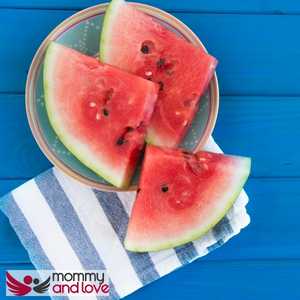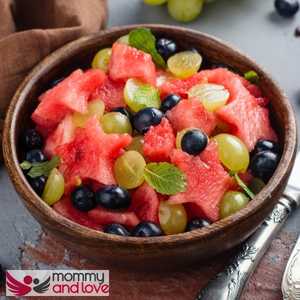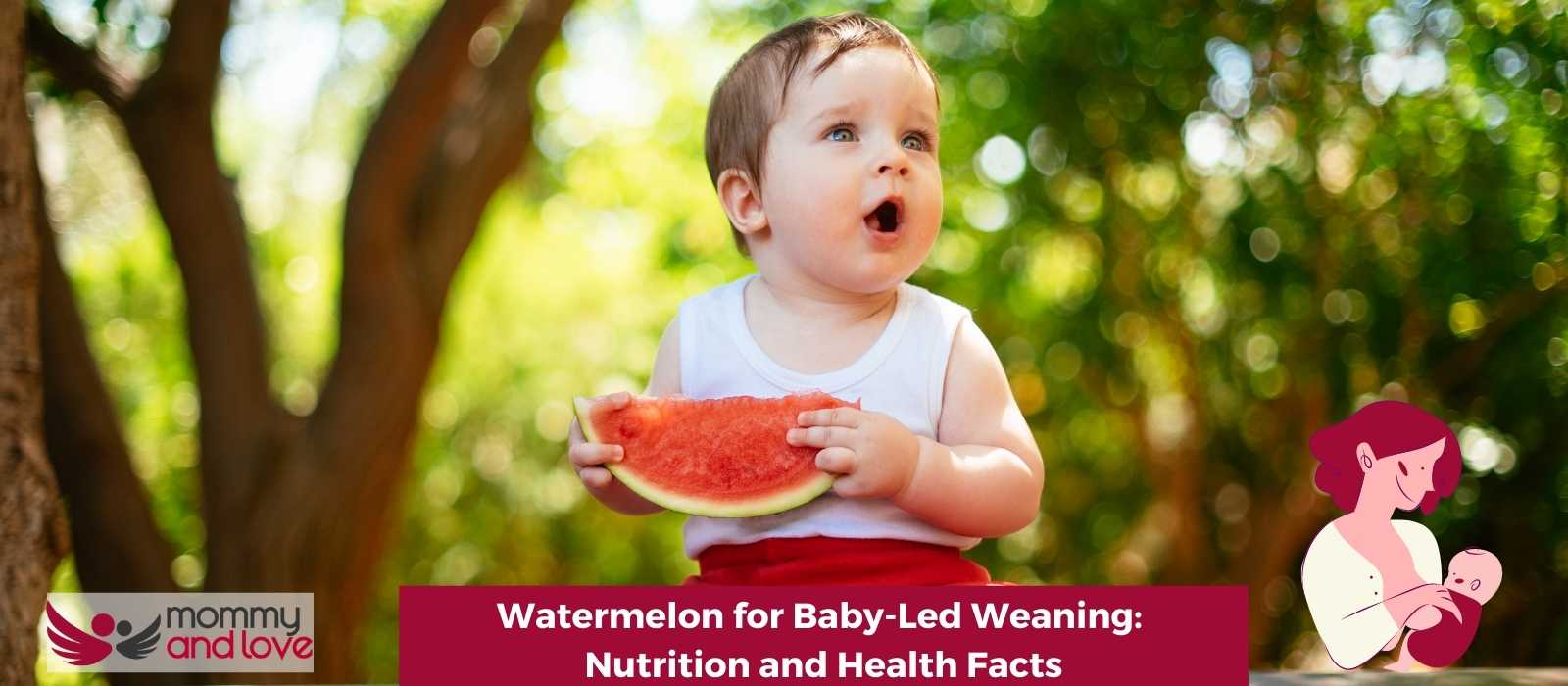Watermelon is a great fruit to introduce to your baby during the process of baby-led weaning. It is packed with nutrients and health benefits, making it a perfect choice for your little one.
In this blog post, we will discuss the nutritional value of a ripe watermelon, when can a baby eat watermelon and some of the health benefits that it provides. We will also provide tips on how to prepare watermelon for your baby. Let’s get started!
What Are the Health Benefits of Watermelon for Babies?
A ripe watermelon is a great fruit for babies. It is a perfect first food to introduce because it’s so soft and easy to eat. There are many health benefits of watermelon for babies. For example, the flesh is mostly water and it contains high levels of lycopene.
Watermelon is also known for its high potassium content. Lycopene, potassium and dietary fiber all work together in maintaining cardiovascular health.
Watermelon also contains vitamins A and C, both of which are essential for growth and development in babies. Plus, watermelon also has vitamin B6, which works to improve brain function.
It is also rich in calcium and manganese which are essential for healthy bone development.
The lycopene in watermelon can also help keep your eyes healthy, reduce inflammation and protect against cell damage linked to heart disease and diabetes.
Vitamin C helps fight against viruses, strengthens a baby’s immune system and aids iron absorption.
When Can Babies Eat Watermelon?

Watermelon is a great fruit to introduce to babies. It is sweet and juicy, and it contains important nutrients that help the baby grow and develop.
So when can babies eat watermelon? Most babies can start eating watermelon when they are about six months old. Before you give your baby watermelon for the first time, make sure she is developmentally ready for solids. When your baby is ready, give her a small piece of watermelon to eat.
Like any other new food, introduce watermelon in small amounts and then gradually increase it over time while watching out for a possible allergic reaction.
Remember to always prepare watermelon properly. Make sure to cut watermelon into small pieces so that it is easy for the baby to chew and swallow. If your baby seems to be having trouble swallowing the watermelon pieces, try mashing them up a bit.
Is Watermelon Good for Constipation in Babies?
When your baby is constipated, his stool is hard and he has trouble eliminating it. In addition to the discomfort this causes, you may notice blood on the stool if your baby’s skin tears while passing the stool.
Watermelon provides water and fiber to help relieve constipation. Watermelon juice might be more effective than fresh watermelon because the juicing process makes it easier for a baby to digest and absorb.
Water Content
Watermelon is about 91 percent water, which makes it a good choice as a mild, natural laxative for babies and children. Additionally, it provides a source of electrolytes, such as potassium, which helps prevent dehydration — a potential concern associated with constipation.
Adding pureed or mashed watermelon or a little juice to foods can help increase the number of fluids in your child’s diet. Babies who are breastfed get plenty of liquids through mother’s milk. However, babies who are fed formula may benefit from an increase in liquids if they are constipated.
Fiber Content
Watermelon is a good source of fiber which helps keep the digestive tract healthy for babies. The fiber content can help alleviate constipation in babies who are already eating solid foods and drinking water. However, watermelon has a high sugar content and can cause diarrhea in some babies.
Can Watermelon Cause Diarrhea in Babies?
The answer to this question is yes, watermelon can cause diarrhea in babies. Watermelon is a fruit that is high in sugar and about 90% water.
It can be difficult for a baby’s digestive system to process. This can lead to diarrhea.
Diarrhea can be dangerous for babies, so it is important to get it under control as soon as possible. There are several things you can do to help your baby’s digestive system process watermelon better and prevent diarrhea.
One thing you can do is give your baby smaller portions of watermelon at a time. You can also mix the watermelon with other fruits or vegetables to make it easier for the baby to digest.
Is Watermelon a Choking Hazard for Babies?
Before feeding watermelon to your child, there are a few things you need to know about this nutritious fruit.
Some parents worry that watermelon may be a choking hazard for their baby. While it is true that it can cause choking especially the watermelon seeds, it is not as common as some people think. In fact, most babies are able to handle small pieces of watermelon without any problems.
If you are worried about your baby choking on watermelon, there are a few things you can do to help keep them safe. First, cut the watermelon into small pieces and remove all the seeds. You should also make sure your baby is sitting up when they eat watermelon and that they are taking small bites.
If your baby does choke on watermelon, don’t panic. Stay calm and try to dislodge the piece of watermelon from their throat. If you are unable to do so, seek medical help right away. Choking is a serious emergency and can be life-threatening if not treated properly.
Can Watermelon Cause Allergic Reactions in Babies?
Watermelon allergies are extremely rare. However, a few sensitive babies with oral allergy syndrome shouldn’t consume watermelon because they may be sensitive to watermelons.
In the United States, true food allergies affect only about five percent of children under three years old and about four percent of adults.
Signs of allergies include hives, rashes, vomiting, runny nose and difficulty breathing. You should also watch out for diaper rash due to watermelon’s acidic nature.
How to Choose and Store Watermelon as Baby Food
When choosing a good quality watermelon, look for one that is firm, symmetrical, and free from bruises or soft spots. And when you tap a fully-ripened watermelon, it should sound hollow.
No need to go organic but you should pick a seedless watermelon. Also, watermelon rinds should be green and the flesh should be red. Stay away from frozen or canned watermelon.
Store leftover watermelon at room temperature for two or three days. If you need to store it for longer, wrap it with food-grade plastic and place it in the refrigerator. Bring frozen or refrigerated melon to room temperature before serving it to your baby.
How to Cut and Serve Watermelon for Your Baby
Giving watermelon as the first solid food is a fantastic idea. It’s easy to cut into small bite-sized pieces that are the perfect size for little fingers.
Cut the watermelon in half using a sharp knife. Cut each half of the watermelon into thin slices. Then, cut each slice into small pieces.
How to Mix Watermelon With Other Baby Food

Sweet watermelon is a great finger food to add to your baby’s diet. It’s sweet, nutritious, contains Vitamin C, and easy to digest. Serving watermelon to your baby alone is a good idea.
But you make watermelon healthy by mixing it with other baby foods. Here are a few watermelon recipes:
- Mix with baby cereal for a light and fluffy texture or with oatmeal for a filling breakfast.
- Puree watermelon flesh in a blender or food processor to make a smooth watermelon puree that can be spoon-fed or frozen into ice cube trays. You can also feed the extracted juice to your baby.
- Mix the frozen watermelon puree with yogurt, applesauce, mashed banana or other soft fruits.
- You can make watermelon popsicles out of the pureed watermelon.
Fruit Salad
One of the best things about using watermelon for your fruit salad is that it doesn’t need to be prepared in any particular way. You can cut it up into pieces, or you can cut it into slices, or even cubes. You can add other fruits to the salad, but you don’t have to if you don’t want to.
Some parents like adding grapes, bananas, or apples to their fruit salads because they are easy for babies to pick up with their fingers and put into their mouths. Make sure to prepare all these fruits in age-appropriate sizes.
Watermelon Baby Food
Ingredients:
- One cup of watermelon, cubed
- One tablespoon of honey
Instructions:
- Place the watermelon cubes in a blender and blend until smooth.
- Add the honey and blend again.
- Pour the baby food into a jar or air-tight container and store it in the fridge for up to three days.
There are plenty more watermelon recipes out there so pick one that you think is easy to make and your baby will like.
Conclusion
Watermelon for babies is great food and a healthy snack for babies. Despite having mixed consistency, it’s fairly easy to prepare that babies eat them using their little fingers. It’s also sweet, nutritious, and easy to digest.
It’s packed with vitamins and minerals that help develop a baby’s immune system and brain development. It is also a versatile fruit. You can feed watermelon as is or with other foods.

This article was written by Sandra Baker – full time writer and the mother of four amazing kids (including twins!)
She’s also a breastfeeding counselor and has spent years helping new parents learn how to care for their children. When she’s not writing or caring for her children, Sandra likes to spend time reading and taking walks with her husband.




